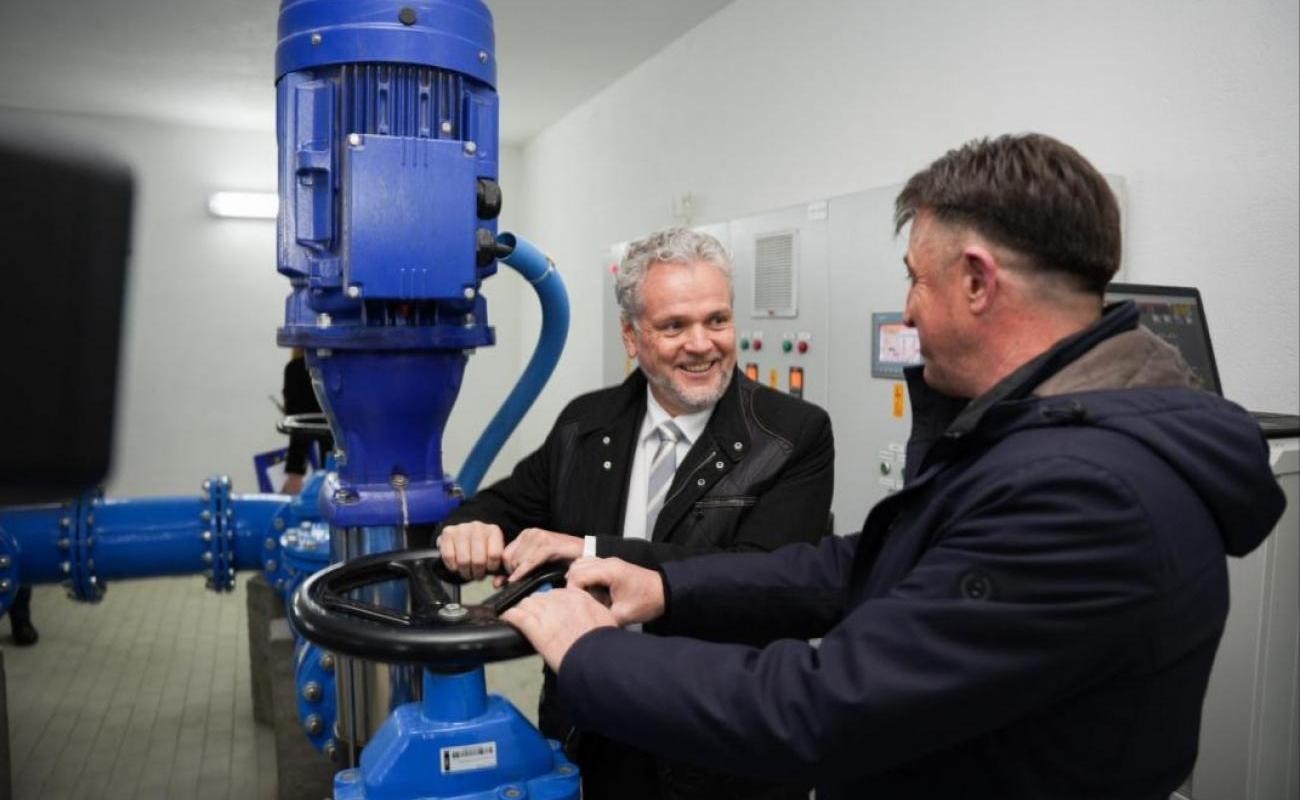EU, bilateral donors and EBRD partner with Gradačac to renovate the water supply network

The Head of the EU Delegation and the EU Special Representative in BiH Ambassador Johann Sattler and the Mayor of Gradačac Edis Dervišagić marked the completion of the project to renovate the water supply network in Gradačac by symbolically putting the water distribution system into operation at the Kerep pumping station today. The EU Western Balkans Investment Framework (WBIF) funded the renovation of 40 km of the Gradačac municipality's water supply infrastructure, ensuring regular functioning and distribution of drinking water to some 20,000 residents of this city.
This marks the completion of a comprehensive project aimed at enhancing and modernising the municipal infrastructure. This project incorporated various initiatives such as the reconstruction of wastewater treatment facilities supported by the Czech government, the expansion of the sewage network supported by the Swedish government, and the expansion and reconstruction of the water supply system supported by the European Bank for Reconstruction and Development (EBRD) and the European Union.
"The modernisation of Gradačac’s water supply network marks a new beginning for the 20,000 residents of the city, with cleaner and safer water, and less wastage. I am glad that EU and EBRD support has been complemented by financing from the Czech Republic, Sweden and Norway – this is a true Team Europe approach, helping BiH to align with EU standards. This is a step forward in our collective efforts to improve the water systems across the country and supporting BiH to meet its commitments under the Green Agenda for the Western Balkans," Ambassador Sattler said.
This joint initiative between the City of Gradačac and its partners has enabled Gradačac to become one of the first cities in Bosnia and Herzegovina to replace all asbestos-cement pipes in the water supply system. The total investment amounts to around €17 million, with over €2.6 million in grants secured through the EU Western Balkans Investment Framework via bilateral donors and €6 million loan from the EBRD.
The event was also attended by the Norwegian Ambassador to BiH, Olav Reinertsen, the Swedish Ambassador to BiH Helena Lagerlöf, the Czech Republic Embassy Consul and Head of Cooperation Štěpán Šantruček, the Head of the EBRD in BiH Manuela Naessl and other guests.
“What City of Gradačac has achieved with this project is an example for other municipalities and cities across BiH. This is about making the lives of citizens easier and also about coming closer to the EU. This is also a concrete example that bilateral donors and international financial institutions can work together with local community and the city and create good projects such as this one,” stated Norwegian Ambassador Olav Reinertsen.
By reconstructing and expanding the water supply network and replacing asbestos-cement pipes, the quality and reliability of water supply to the citizens of the Gradačac municipality has been improved, which will have a positive impact on health, quality of life, and environmental protection.
"Through this project, over 40 km of new sewage network was built, and over 40 km of old asbestos-cement network was replaced, which completely rid Gradačac of those water pipes. We can say that in a certain way we are pioneers in Bosnia and Herzegovina and that the City of Gradačac has solved the issue of water supply through the implementation of this project," emphasized Gradačac Mayor Edis Dervišagić.
The project to renew the municipal infrastructure in Gradačac is in line with the priorities of the EU Economic and Investment Plan for the Western Balkans defined within the Flagship Project 7 - Solid Waste and Wastewater Management. The project is also fully compliant with the EU Water Framework Directive and Drinking Water Directive, as well as the Green Agenda.
“Investing in efficient, safe and greener municipal infrastructure remains one of our key strategic priorities and the EBRD and its donors stand ready to provide finance and support for it,” says Manuela Naessl, EBRD Head of Bosnia and Herzegovina. “We look forward to supporting more cities in the country in improving their critical infrastructure and environmental conditions and will continue to work with the Government to provide the right framework conditions to make those investments sustainable.”
The project in Gradačac is just one part of the comprehensive support from the European Union to improve water management and wastewater treatment in Bosnia and Herzegovina. Through Instrument for Pre-Accession (IPA) funds, the EU has provided approximately €83 million in grants to help Bosnia and Herzegovina align with EU standards in the field of water management, urban wastewater treatment, and drinking water.
Additionally, significant investments have been made in water and waste management infrastructure in collaboration with international financial institutions, with EU grant funds from the EU Western Balkans Investment Framework complementing favourable loans from international financial institutions. This supports efforts to expand and rebuild water delivery networks in Visoko, Sarajevo, and Banja Luka.
More information on projects funded in BiH under the EU Western Balkans Investment Framework is available at https://www.wbif.eu/investment-grants
